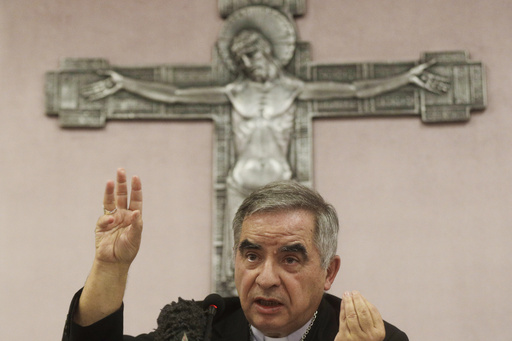
NEW YORK — A cardinal has been found guilty of aggravated fraud and additional offenses by a Vatican tribunal, which highlighted his “objectively inexplicable behavior” for disbursing over half a million euros in Vatican funds to a self-identified intelligence analyst, who then used the money for luxury goods and vacations.
On Wednesday, the tribunal released a comprehensive 816-page document that elaborated on the verdicts delivered on December 16 during what has been labeled the Vatican’s “trial of the century.” The extensive trial lasted two years and involved ten individuals, stemming from the Holy See’s substantial investment of 350 million euros (approximately $380 million) in a London real estate development, which eventually expanded to include various financial misconduct allegations.
Cardinal Angelo Becciu, a once-influential figure and former No. 3 in the Vatican’s secretariat of state, emerged as the highest-profile defendant among the nine found guilty. He has received a prison sentence of five-and-a-half years as a result of his convictions for embezzlement, fraud, and other infractions.
All ten defendants, including Becciu, have indicated plans to appeal the decisions, as has the Vatican’s prosecutor. Now that the tribunal’s written reasoning is available—nearly a year after the initial judgments—both parties are now able to expand on the reasons for their appeals.
Central to the case was the involvement of the Vatican secretariat of state in funding the conversion of a former Harrod’s warehouse into luxury apartments. Prosecutors contended that various Vatican officials and brokers defrauded the Holy See out of millions in fees and commissions, subsequently extorting an additional 15 million euros for relinquishing control of the property.
Becciu’s conviction for embezzlement revolves around the Vatican’s initial 200 million euro investment in the fund aimed at the London property. The tribunal concluded that canon law deemed such speculative investments of church assets as impermissible.
Furthermore, Becciu was found guilty of aggravated fraud related to payments amounting to 575,000 euros made to Cecilia Marogna, a self-proclaimed intelligence consultant from Sardinia. He initially claimed these payments were sanctioned by Pope Francis as ransom to secure the release of a Colombian nun taken hostage by al-Qaida-affiliated groups in Mali.
Investigations revealed that Becciu effectively charged the Vatican twice, sending the same sum to a British security firm that specializes in hostage situations, casting doubt on Marogna’s involvement in the nun’s eventual release, which occurred later.
Judge Giuseppe Pignatone, presiding over the tribunal, noted Becciu’s failure to offer a credible explanation for the duplicate payments to Marogna or his lack of inquiries regarding her purported efforts to secure the nun’s freedom. Despite being alerted by Vatican security that Marogna was misappropriating the funds for luxury vacations and high-end purchases, Becciu did not report her actions or distance himself from her, maintaining communication through mutual acquaintances.
The tribunal criticized Becciu’s conduct as “objectively inexplicable,” particularly for someone of his stature—a cardinal who once held considerable trust from the pope. The ruling emphasized that Becciu has never effectively clarified his actions.
Meanwhile, Marogna, who was tried in her absence, also faced conviction, receiving a sentence of three years and nine months. Her defense included inconsistent justifications, prompting skepticism from the tribunal.
The majority of the tribunal’s written rationale was dedicated to unraveling the intricate financial dealings associated with the London investment. Additionally, the document reiterated the tribunal’s earlier dismissal of claims asserting that the trial was fundamentally unfair.
